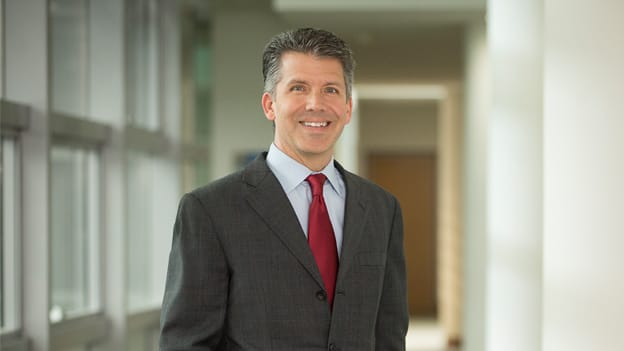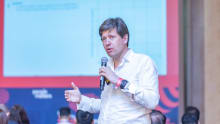'Instead of trying to predict the future, we should get on with creating the future'

TechHR Singapore 2019 Read similar articles

If tech transformation is the need of the hour for organizations, leaders who can drive that transformation are a greater need. Because tech alone will not solve all the problems or smoothen all the hiccups in transformation. Be it driving a successful transformation or culture, leadership is a key ingredient. Which brings us to the next question-what do leaders of today need to imbibe in order to drive a successful transformation?
This is what Dr. Rick Smith, Professor of Strategic Management (Practice), Singapore Management University will touch upon at a panel discussion at TechHR Singapore on 28th February 2019. As the Deputy Dean for one of the top-ranked business schools in the world, and a former Accenture Partner and Managing Director, Rick brings a unique perspective as a business school professor.
In an exclusive interaction with People Matters, Dr. Rick Smith shares his views on the often overlooked ingredients of tech transformation - leadership & culture and what can leaders do to foster a culture of innovation.
What are the key points leaders need to keep in mind while designing a digital transformation agenda for their organizations?
First, it is important to note that there is a lot of hype about “Digital Disruption” these days. I see too many organizations trying to take on the topic of “Digital” without really focusing their efforts on something that is meaningful to the people in the organization. Leaders going around talking about digital disruption or digital transformation does not serve any purpose – only creates anxiety and uncertainty. In other words, leaders would be better served to break down the topic into meaningful topics that are linked to areas of the business. For example, we might consider how AI will enhance and impact customer service operations or how we might benefit from smart products using an IOT approach.
Second, once we break down the topic into a clear focus area, leaders should consider how to position the transformation in a way that becomes an opportunity.
Too often, business transformation efforts become synonymous with lay-offs or staff reduction efforts and have a negative orientation in organizations.
Creating a vision on what might be possible and how it might be good for the company growth (and career growth) is ideal.
Third, once there is a clear sense of an opportunity, the employees should be encouraged to learn about the technology and offer ideas. There are many great on-line overviews and training courses available to help people get a sense of what is possible. For example, if the future plan is to enhance customer service with AI using bots, then having employees experiment with the tools and suggesting ideas can be a great way to bring them along with a powerful digital experience.
What can leaders do to foster a culture which facilitates transformation and innovation?
I just released new research on this topic. In our study of more than 800 organizations and 400,000 survey respondents across 8 countries in Asia Pacific, we find that creating an environment with high levels of Psychological Safety has a significant impact.
“Psychological safety is a sense of confidence that the team will not embarrass, reject or punish someone for speaking up,” wrote Harvard Business School Professor Amy Edmondson. A psychologically safe environment is one where interpersonal trust exists, and mutual respect is given daily. It is an environment where people are comfortable being themselves.
Why Psychological safety is important because high-performing teams were not defined by who its members were but by how they treated one another.
Behavioral integrity of leaders is one of the essential factors for building up psychological safety within a culture. A culture with a high level of psychological safety can have positive implications on team performance, which can impact long-term business outcomes. Hence leaders need to invest time in clear action plans for culture shaping. They need to provide clear role models and clear guidelines for desired behavior as well as commit to sustained, long-term efforts to achieve meaningful and effective transformation at all levels of the organization.
In today’s dynamically changing world, what are the key skills a leader needs to imbibe to deliver?
All across Asia, I see many business leaders working hard to deliver results. In this region, we work hard and many will work long hours every day. While this is admirable, it is also easy to get blind-sided with changes in the industry or market. Therefore, it is important for leaders to break out of the work cycle to allow thinking time, research time, and exploring time. Here are three suggestions:
Mindfulness – research tells us that practicing mindfulness improves our decision-making, reduces stress, and helps our focus. Leaders should find some way to incorporate some type of reflection and time into their regular routines.
Business Sensing – we are often so busy with our own businesses, that we may not be paying attention to the markets or industry. Blocking out time for exploring questions, analyzing markets, examining slight competitive moves can help ensure we are leading in the right directions.
Blue Sky Thinking – what does the future hold for our business? History tells us that disruption often comes from outside our industry and that we can learn quite a bit by asking tough questions or exploring other industries. For example, if you are you trying to improve customer service at a bank, consider what you might learn from a hospital or from a high-end retailer. Taking time to ask questions – or even think about big questions does not always show up as an activity on the calendar – block out some time and see what happens!
What are the key things should leaders keep in mind to while designing a succession plan?
When leaders take a new post, it is important to not only listen and get a full understanding of the current environment but also to test out some of the key players to identify potential successors. While it may sound counter-intuitive, I like to suggest that identifying potential successors is part of the first 90-day plan in any new role.
The other suggestion is to have not just one successor in mind but consider two. If one does not work out or gets a better offer in the meantime, you have options.
It is important that your own career opportunities are not limited by your own lack of succession planning.
In today’s fast-changing world of work, what are the key challenges faced by leaders in the APAC region?
We are at an interesting time of questions about political policies, trade agreements, and globalization. The flow of business and commerce has dramatically changed in the last decade from the “East meets West” orientation.
Our new challenge is how we operate and maximize business in our region in what I call the “East meets East” era of business.
The countries of Asia vary greatly in terms of size, economic development, regulatory policy, language, culture, and infrastructure. Working across borders in Asia is one of the key challenges and success factors for businesses in APAC.
What would be your advice to HR entrepreneurs and leaders as far as the future of work is concerned?
It seems like we have been talking about the future of work for as long as there has been work. For example in November 1977, Xerox held a conference on the topic and predicted the elimination of “office work” with the advent of computers. While computer automation has certainly changed the nature of work, most forecasts about the future of work are limited as we can only project the future based on our knowledge of the present (a problem of bounded rationality). Instead of trying to predict the future of work, I suggest we just get on with creating the future one step at a time.
Dr. Rick Smith will be speaking at TechHR Singapore on 28th February 2019 at Marina Bay Sands, Singapore. Register now.







